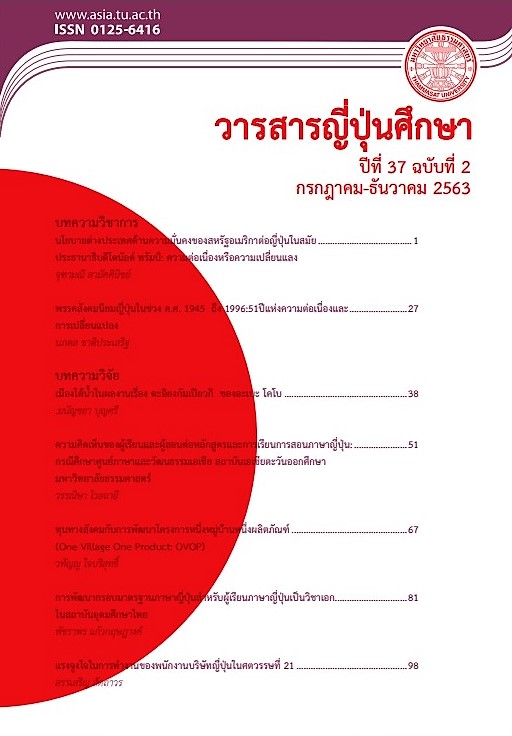Trump’s Foreign Policy and U.S.-Japan Security Relations: Continuity or Change
Keywords:
Foreign Policy, U.S., Japan, Donald Trump, SecurityAbstract
After the end of World War II, the United States has been central in Japan’s security policy. For the US, Japan is also a significant ally in terms of security concerns, ranging from hedging against Chinese military expansion in the Asia-Pacific to confronting threats from North Korea’s nuclear and missile programs. There is no question that the alliance continues to serve the fundamental interests of both parties. This article examines US president Donald Trump’s security policy towards Japan. It seeks to understand whether this policy changed during Trump’s presidency compared to that of previous governments.
This paper finds that Trump’s security policy towards Japan was a part of the Free and Open Indo-Pacific Strategy, which aims to counter China’s military and economic rise in the region and to solve the North Korea crisis diplomatically. Trump’s security policy towards Japan changed in many aspects during his four-year term in office. There are several factors, both internal and external, that led to policy changes. In terms of the internal factors, US security policy towards Japan has been uncertain as a result of Trump’s unpredictable decisions. In terms of the external factors, Shinzo Abe’s security policy, the crisis on the Korean Peninsula, and Chinese military modernization have highly impacted US-Japan relations under Trump’s presidency.
Downloads
References
รุ่งลาวรรณ รุ่งวัฒน์ภัทร. (2015) “รัฐธรรมนูญแห่งประเทศญี่ปุ่น มาตรา 9: ความพยายามที่จะแก้ไขของนายกรัฐมนตรีชินโซ อาเบะ.” วารสารญี่ปุ่นศึกษา, 32 (2), 65-79.
ศิริพร ดาบเพชร. (2014) “Anpo Protests: พัฒนาการของการเคลื่อนไหวทางการเมืองในญี่ปุ่นยุคหลังสงคราม.” วารสารสังคมศาสตร์ มหาวิทยาลัยศรีนครินทรวิโรฒ, 17 (มกราคม-ธันวาคม), 328-338.
ฮิซาฮิโกะ โอกาซากิ. b(1992) มหายุทธศาสตร์สำหรับการป้องกันประเทศของญี่ปุ่น. แปลโดย ไชยวัฒน์ ค้ำชู และกมล เพ็ญศรีนุกูร กรุงเทพฯ: ศูนย์ญี่ปุ่นศึกษา สถาบันเอเชียตะวันออกศึกษา มหาวิทยาลัยธรรมศาสตร์.
Adlakha, Hemant. (2020) “Chinese Experts Think US-China Rivalry Accelerated Abe Shinzo’s Departure.” The Diplomat (2 September)
Brason, Philip. (2019) “Uncovering Japan's involvement in the Korean War.” Japan Times (7 September).
Bisley, Nick. (2020) “Security policy in Asia from Obama to Trump Autopilot, neglect or worse?.” The United States in the Indo-Pacific Obama’s Legacy and the Trump Transition (eds. Oliver Turner and Inderjeet Parmar) Manchester: Manchester University Press.
Frohlich, Thomas C. (2019) “Saudi Arabia buys the most weapons from the US government. See what other countries top list.” USA Today. (26 March)
Fodale, Hannah. (2020) “Abe’s Investment in His Relationship with President Trump has Advanced Japanese Interests.” Debating Japan, 3(1).
Ford, Lindsey. (2020) “The Trump Administration and ‘Free and Open Indo-Pacific.’” Brookings Institution. (May)
Gaouette, Nicole, and Ryan Browne. (2016) “U.S. affirms Japan security backing after Trump nuclear comments.” CNN. (31 March)
Green, Michael. (2000) “The Challenging of Managing U.S.-Japan Security Relations after the Cold War.” New Perspectives on U.S.-Japan Relations (ed. Gerald L. Curtis) Tokyo: Japan Center for International Exchange.
Johnson, Jesse, and Satoshi Sugiyama. (2020) “Trump lauds Abe as Japan’s ‘greatest prime minister’ as bromance set to end.” The Japan Times. (31 August)
Katzman, Kenneth. (2020) “COVID-19 and U.S. Iran Policy.” Congressional Research Service. (13 April)
Kelly, Tim. (2018) “Japan to buy more U.S.-made stealth jets, radar to counter China, Russia.” Reuters. (18 December)
Keneally, Meghan. (2018) “From ‘fire and fury’ to ‘rocket man,’ the various barbs traded between Trump and Kim Jong Un.” ABC News. (12 June)
Kessler, Glenn, Salvador Rizzo and Meg Kelly. (2019) “President Trump has made 9,014 false or misleading claims over 773 days.” The Washington Post. (4 March)
Liptak, Kevin, and Allie Malloy. (2019) “Trump tweets Kim Jong Un an invitation to ‘shake his hand’ at DMZ.” CNN. (29 June)
Liff, Adam P, Ko Maeda. (2018) “Why Shinzo Abe faces an uphill battle to revise Japan’s constitution.” Brookings Institution. (15 December)
Lowrey, Annie. (2009) “So what did Obama do to get the Nobel Peace Prize?” Foreign Policy. (9 October)
Macdonald, Paul K. (2018) “America First? Explaining Continuity and Change in Trump's Foreign Policy.” Political Science Quarterly, 133 (3), 401-434.
Malone, David M., and Yuen F. Khong, ed. (2003) Unilateralism and U.S. Foreign Policy: International Perspectives Boulder, CO: Lynne Rienner Publishers, Inc.
McCurry, Justin. (2012) “Japan’s Shinzo Abe: Will the New Prime Minister Boost Confrontation With China and South Korea?” CNBC. (18 December)
McGregor, Richard. (2017) Asia’s Reckoning: China, Japan, and the Fate of U.S. Power in the Pacific Century. New York: Viking Penguin.
Mealey, Rachel. (2016) “Japanese PM Shinzo Abe meets with Donald Trump in first foreign leader meeting.” ABC News. (18 November)
Midford, Paul. (2018) “New directions in Japan's security: non-US centric evolution, introduction to a special issue.” The Pacific Review, 31(4), 407-403.
Saha, Premesha. (2020) “From ‘Pivot to Asia’ to Trump’s ARIA: What Drives the US Current Asia Policy.” ORF Occasional Paper No. 236. Observer Research Foundation.
Sato, Taketsugu. (2020) “U.S. diplomat confident that U.S., Japan will contribute more to alliance.” The Asahi Shimbun. (31 January)
Schoff, James L. (2018) “Political Change in America and Implications for the US-Japan Alliance.” Asia-Pacific Review, 25(2), 45-63.
Smith, Sheila A. (2017) “U.S.-Japan Relations in a Trump Administration.” Asia Policy, 23, 13-20.
Tatsumi, Yuki. (2017) “The US National Security Strategy: Implications for the Indo-Pacific.” The Diplomat. (21 December)
Tsuruoka, Michito. (2018) “The Donald J. Trump Administration as Seen from Tokyo: Will the US-Japan Alliance Remain Unique?” Istituto Affari Internazionali (IAI), 18(2), 1-16.
Worland, Justin. (2020) “The U.S. Relationship With China Is in Trouble. That's a Challenge for Climate Change.”Time. (21 May)
Yoshino, Naoya. (2020) “With charts, stats and golf, Abe proved Japan's worth to US leader.” Nikkei Asia (26 September)




